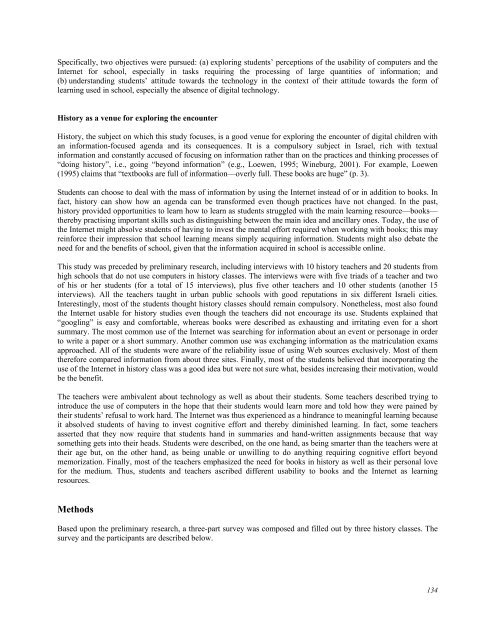Download - Educational Technology & Society
Download - Educational Technology & Society
Download - Educational Technology & Society
Create successful ePaper yourself
Turn your PDF publications into a flip-book with our unique Google optimized e-Paper software.
Specifically, two objectives were pursued: (a) exploring students’ perceptions of the usability of computers and the<br />
Internet for school, especially in tasks requiring the processing of large quantities of information; and<br />
(b) understanding students’ attitude towards the technology in the context of their attitude towards the form of<br />
learning used in school, especially the absence of digital technology.<br />
History as a venue for exploring the encounter<br />
History, the subject on which this study focuses, is a good venue for exploring the encounter of digital children with<br />
an information-focused agenda and its consequences. It is a compulsory subject in Israel, rich with textual<br />
information and constantly accused of focusing on information rather than on the practices and thinking processes of<br />
“doing history”, i.e., going “beyond information” (e.g., Loewen, 1995; Wineburg, 2001). For example, Loewen<br />
(1995) claims that “textbooks are full of information—overly full. These books are huge” (p. 3).<br />
Students can choose to deal with the mass of information by using the Internet instead of or in addition to books. In<br />
fact, history can show how an agenda can be transformed even though practices have not changed. In the past,<br />
history provided opportunities to learn how to learn as students struggled with the main learning resource—books—<br />
thereby practising important skills such as distinguishing between the main idea and ancillary ones. Today, the use of<br />
the Internet might absolve students of having to invest the mental effort required when working with books; this may<br />
reinforce their impression that school learning means simply acquiring information. Students might also debate the<br />
need for and the benefits of school, given that the information acquired in school is accessible online.<br />
This study was preceded by preliminary research, including interviews with 10 history teachers and 20 students from<br />
high schools that do not use computers in history classes. The interviews were with five triads of a teacher and two<br />
of his or her students (for a total of 15 interviews), plus five other teachers and 10 other students (another 15<br />
interviews). All the teachers taught in urban public schools with good reputations in six different Israeli cities.<br />
Interestingly, most of the students thought history classes should remain compulsory. Nonetheless, most also found<br />
the Internet usable for history studies even though the teachers did not encourage its use. Students explained that<br />
“googling” is easy and comfortable, whereas books were described as exhausting and irritating even for a short<br />
summary. The most common use of the Internet was searching for information about an event or personage in order<br />
to write a paper or a short summary. Another common use was exchanging information as the matriculation exams<br />
approached. All of the students were aware of the reliability issue of using Web sources exclusively. Most of them<br />
therefore compared information from about three sites. Finally, most of the students believed that incorporating the<br />
use of the Internet in history class was a good idea but were not sure what, besides increasing their motivation, would<br />
be the benefit.<br />
The teachers were ambivalent about technology as well as about their students. Some teachers described trying to<br />
introduce the use of computers in the hope that their students would learn more and told how they were pained by<br />
their students’ refusal to work hard. The Internet was thus experienced as a hindrance to meaningful learning because<br />
it absolved students of having to invest cognitive effort and thereby diminished learning. In fact, some teachers<br />
asserted that they now require that students hand in summaries and hand-written assignments because that way<br />
something gets into their heads. Students were described, on the one hand, as being smarter than the teachers were at<br />
their age but, on the other hand, as being unable or unwilling to do anything requiring cognitive effort beyond<br />
memorization. Finally, most of the teachers emphasized the need for books in history as well as their personal love<br />
for the medium. Thus, students and teachers ascribed different usability to books and the Internet as learning<br />
resources.<br />
Methods<br />
Based upon the preliminary research, a three-part survey was composed and filled out by three history classes. The<br />
survey and the participants are described below.<br />
134
















